A Legacy of Compassion



Mary Lucey’s eyes told all. ACT UP/LA’s firebrand was grounded, determined but deferred to Judy Cagle, the trembling center of the April 1, 1992 news conference at Being Alive’s Silver Lake headquarters. Cagle’s compassionate release from the California Institute for Women in Frontera five days earlier enabled the 37-year-old mother of a 16-year-old son to go home to die of AIDS.
Mary, also formerly incarcerated and diagnosed with HIV/ AIDS, had been fighting for Cagle’s freedom for two years. Listening to Cagle beseech the public to care about women inmates, Mary’s eyes betrayed the moral burden she bore with anger, anguish, love and compassion.
Nancy was fighting back with physical therapy, though she had become noticeably quieter. Mary — who was in constant pain — was her stubborn, brave primary care provider. Nancy died of natural causes. The cause of Mary’s death is still undetermined.
Timer, their old mixed boy, looked for them after almost everyone left. The sweet animal orphan is being cared for by a member of Mary and Nancy’s community.”
Boulevard. The Coalition for Compassion urged the Food and Drug Administration to add a parallel track to their glacier testing procedure and release experiential drugs to PWAs as compassionate triage. Luckily, writer Bruce Mirken joined ACT UP/LA and reported for the LA Reader on activism, scientific developments, and the pharmaceutical alphabet of AIDS drugs like AZT and ddi. I wrote about policy, politics and events that challenged and deepened our humanity in the face of death.
“I want people I left behind to know I love them,” Cagle, who would die six months later, told reporters. “Just don’t give up. You’ve got to fight. You’ve got to know your lives are important.”
Mary felt the same, as she shared with HIV Plus magazine: “After I was released from prison, I felt I could not turn my back on women who still suffer behind bars. It is our responsibility to continue to bring attention to the cruelty that people with HIV/AIDS face in the prison system.”
That was the Mary Lucey I met in 1990 after she joined ACT UP/LA (the Los Angeles branch of the AIDS Coalition to Unleash Power) and fell in love with Nancy MacNeil, the HIV-negative leftist AIDS activist who became her constant companion and future wife. Though I thought Nancy eyed me with suspicion and enjoyed the dyke art of intimidation, I was taken by their love story. Like Paul Monette and Stephen Kolzak (and later, Winston Wilde) andJeff Schuerholz and Pete Jimenez, the ACT UP/LA couple defied death and danced with delight in a civil rights and healthcare minefield.

For Mary and Nancy, the dance ended unexpectedly on Saturday, Feb. 11. Mary got up and started to prepare breakfast, letting Nancy sleep in as usual, close friends say. But when she checked on Nancy, she found her beloved unresponsive. Nancy had died.
Mary called her neighbor and Jeff Schuerholz, her very close friend from ACT UP/LA. Jeff immediately called another close friend, Keiko Lane and the two promised to speed up to Oceano in San Luis Obispo County, 174 miles north on US101 from Los Angeles. Mary was excited for them to come up. However, when Keiko and her partner Lisa picked Jeff up, a family member called to say Mary had also suddenly passed away.

Both women had complicated health issues. After one accidental bone-breaking fall and several back surgeries,
Learning how to be there for people with AIDS (PWAs) was terrifying, loving, infuriating and ultimately, spiritual. After I left the mainstream press in 1984 and started getting involved in the West Hollywood community, I noticed that some of my gay 12 Step friends were getting sick and disappearing. I found them isolated in hospitals where nurses left food outside and we were forced to wear masks and gowns and not touch them. I felt powerless. I didn’t know what to do except not judge and be of service. I took people to doctors’ appointments. I cleaned up messes, consoling friends deeply ashamed about their uncontrollable vulnerability and loss of dignity. I sat at bedsides. I learned that if a friend lashed out in anger it was because he trusted that I wouldn’t leave. I learned to talk about death and how to help my friends die. And like so many others, I searched for spiritual meaning in this ignored growing decimation of human beings.
I longed for a storm of rage from which an army of ghost-bearers would arise to confront this casual hate spewing from government to next door neighbors. Finally, in March 1987, a phalanx of the first wave of ACT UP resisters emerged in New York, harangued into being by curmudgeon playwright Larry Kramer.

ACT UP/LA’s trans AIDS Diva Connie Norman taught me about the range of AIDS issues. Mary Lucey was my second teacher, stressing the invisibility of women and lesbians with AIDS – something I missed because of the active leadership of Connie, Mary, Nancy, Judy Ornelas Sisneros, Patt Riese, Helene Schpak, Keiko Lane, Terry Ford, Mary Nalick, Cindy Crogan, Robin Podolsky, Stephanie Boggs, and Roxy Ventola McGrath, whose remembrance was written by her friend Nancy with whom she, Mary and others co-founded Women Alive, an empowerment organization for women with HIV/AIDS.
“Roxy made us promise to keep fighting. She told Mary to continue to be loud and rude and in people’s faces! She told her to keep doing AIDS activism and AIDS work in whatever capacity that she could be effective for as long as she is healthy enough,” wrote Nancy, Women Alive’s founding executive director. “She told me to keep writing, to tell the women’s stories and give them information about the disease, and try to inspire women into action. She asked me to write about courage and foresight, and to keep trying to give women the incentive to fight back.
‘You’ll write the story, won’t you, Nan?’ Yeah, Rox, I’ll write it. But, you gotta tell it, OK? ‘No,’ she says, ‘I lived it, you tell it.’”
A native Angelino, Nancy Jean MacNeil was both a street and information activist.
ACT UP/LA, founded in December 1987, held meetings in Plummer Park, West Hollywood. I thought about joining, but decided I could best serve as an eyewitness to history with the gay press instead. My first freelance story for Frontiers Newsmagazine was “Ten Days that Shook the FDA,” focused primarily on the hunger strike by PWAs Wayne Karr and Lou Lance in August 1989 at Crescent Heights and Santa Monica
Schooled by police brutality during student protests against the Vietnam War and as a member of the Black Panther Party, Nancy attended the Institute for The Study of Nonviolence in Palo Alto and became an activist and organizer in the gay, lesbian, women’s and Lavender Left movements of the 1970s and 1980s. In 1982, she lost her first friend to AIDS. Julian Turk had been diagnosed by Dr. Michael Gottlieb at UCLA, one of the first identified with the mysterious new disease.
In 1990, after attending the first Women’s Caucus meeting, Nancy joined ACT UP/LA and applied her organizing and pro-

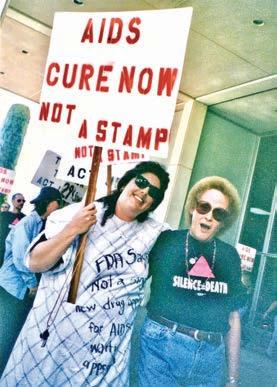

test skills to fighting AIDS. She and Mary advocated for women prisoners and shouted at the CDC, the FDA, the National Institutes for Health and medical researchers to wake up and recognize that their government-funded treatment studies barred women of childbearing age from participating in clinical trials — thus ignoring how women’s bodies might react differently to dosages and drug treatments. Additionally, the exclusion of women in the CDC’s definition of AIDS meant women could not get insurance coverage or qualify for Social Security disability.
Nancy shrugged off living in Mary’s media shadow, such as when Mary was dubbed “The Woman Warrior” by the Washington Post in an Oct. 1, 1991 story about ACT UP and the march on Congress as part of the second AIDS Treatment Activists Conference (ATAC2).
“The Woman Warrior Mary Lucey, 32, a former bus driver and blacksmith and ex-con from Los Angeles, woke up to the fight against AIDS two years ago when she was six months pregnant and learned she was HIV-positive. She couldn’t find a doctor to deliver her baby. Not in Riverside County, where she lived then, or in all of L.A. What she found instead were doctors who prescribed huge doses of AZT that made her lose 0 pounds during her pregnancy. She also found a cause,” the Post wrote. “(Worried by the probability that she had only a few years to live and wouldn’t be able to raise her child, she gave up her baby, who was born in San Francisco, to a couple who have other foster children.)
“‘A lot of women don’t have the inner strength to fight But I don’t take no for an answer. So, I became an activist,’” Mary told the Post. ‘We don’t know how many women have AIDS. Doctors say you’re not at risk. They don’t even include us in AIDS death statistics. My main concern is to get them treated.’”
Mary and Nancy were in Washington DC on Sept. 30, 1991 when Republican Gov. Pete Wilson vetoed AB 101, the gays rights bill he had promised to sign. Though the streets of LA were strewn with thousands of LGBT activists, PWAs and HIV-positive protesters, AIDS had taken a back seat to the politics of the time though Democratic presidential nominee Arkansas Gov. Bill Clinton talked about ending the AIDS crisis in challenging Republican President George H.W. Bush, branded with the Reagan-Bush stain of death.
Then came the unexpected. On Nov. 7, 1991, LA Lakers superstar arvin “Magic” Johnson, 32, held a press conference announcing that he was HIV positive. The world gasped. Magic didn’t look gay or sick — which meant women could “catch” AIDS, too. Suddenly, the “Women and HIV Facing the pidemic” conference at UCLA two days later was packed.
Dr. Julian Falutz told the UCLA conference that AIDS had become one of the top five causes of death for women between the ages of 20 and 40 and the leading cause of death among Black women in that age range.
“We’ve been ignored,” Mary told the LA Times. “Women are starving for information. It’s been a need for a long time.”
Nancy and Mary were also members of the ACT UP National Women’s Committee and Nancy – hired by ACT UP/ LA member and Being Alive executive director Ferd ggan to work for the AIDS organization — used her highly regarded Women Alive newsletter to push issues and actions, including forcing the CDC to change their AIDS definition to include women-specific diseases, opportunistic infections and medical ailments.
In New York, Katrina Haslip, a formerly incarcerated Black Muslim woman, was also a strong voice demanding a new CDC definition, according to ACT UP/NY historian Sarah Schulman. A direct action campaign organized by Haslip and a slew of others “lasted for four years,” Lux Magazine reported in a story about Sarah’s monumental book, “and was led by women of color, poor women, formerly incarcerated women, and lesbians who rallied together under the slogan, ‘Women Don’t Get AIDS, We Just Die from It.’”
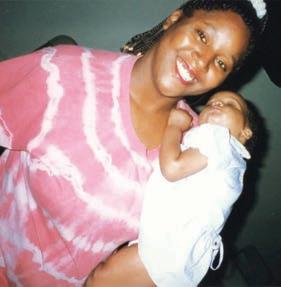
On Jan. 1, 1993, the CDC o cially revised their AIDS definition, adding, among other symptoms, cervical cancer, cervical dysplasia, pelvic in ammatory disease, and infections such as vaginal candidiasis or chronic yeast infections.
Three months later, during the April 1993 March on Washington, Mary and Nancy were among 19 members of ACT UP Network’s Lesbian Caucus who met with Health and Human Services Secretary Donna Shalala who forms lesbian AIDS task force. The CDC subsequently funds lesbian-specific prevention programs and NIH finally studies lesbians.
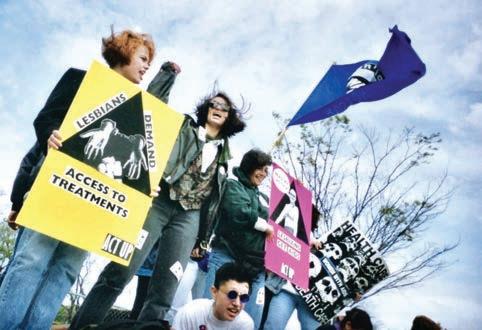
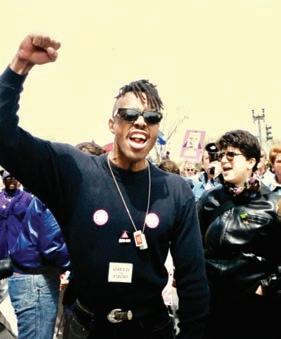
committee “as founding member, visual artist Ren e dgington, recruited more volunteers to launch (Clean Needles Now),” reported -traonline.org
But California’s drug paraphernalia laws made possessing and distributing syringes a crime. Assembly Speaker Willie Brown and LA State Senator Diane Watson passed two bills in the California Legislature to decriminalize needle exchange – but Gov. Pete Wilson vetoed both, claiming the programs would become “a magnet for IV drug users.”
In the late 1980s and early 1990s, ACT UP/LA brought urgent visibility to the dire need for expanded hours, rooms and services at LA County’s horrendously overcrowded AIDS Outpatient Clinic known as P21 and for an AIDS unit at County USC Hospital. “We are tired of government bureaucracy telling us it doesn’t matter. We are tired of government genocide,” Connie Norman told the LA Times. Deemed “militant” because of their rude, in-your-face tactics, ACT UP/LA and ueer Nation organizers frightened producers of the March 2 ,1991 Academy Awards at the Shrine Auditorium and the 1992 Oscars at the Dorothy Chandler Pavilion but most of the AIDS and gay media visibility resulted from attendees wearing the new AIDS Red Ribbons created by Visual AIDS.
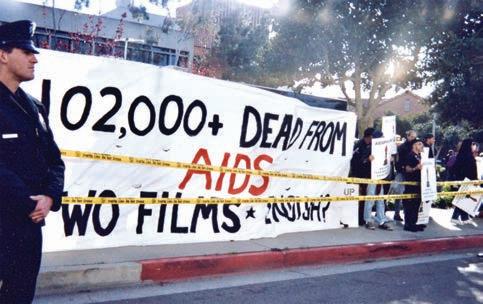
Meanwhile, in 1991 another hidden group — injection drug users sharing dirty needles — was starting to draw attention within ACT UP/LA. “Initially the needle exchange committee attracted people from different committees, including novelist Steven Corbin” from ACT UP’s People of Color Caucus. The
Additionally, there was concern that the needle exchange committee pulled money for syringes and other supplies out of the general fund, cutting into money available for other ACT UP/LA actions such as the huge bus trip to Frontera women’s prison on Nov. 30,1990 to protest the segregated substandard AIDS ward, Walker A. Mary spent 18 months at Frontera and was keenly aware of the lack of proper nutrition, medications and qualified medical staff. On May 4, 1992, ACT UP/LA organized a statewide protest at the California Department of Corrections in Sacramento which mainstream media ignored.
In 1993, new LA Mayor Richard Riordan appointed Ferd ggan as the city’s third AIDS Coordinator. Ferd brought Nancy with him and hired Mary as a City AIDS Policy Analyst. By then, Mary had become adept at public hearings, including one before the CDC in 1992 on changing the definition of AIDS that was turned into a play in 2020 entitled “I, of Course, Was Livid.”
“The outcome of this hearing will have a profound impact on my survival. And yet, a more offensive and revolting fact is that we die without even being counted, as if our lives didn’t mean anything. Don’t our lives count? Then count our deaths,” writer Terri Wilder recalled Mary as saying. The play’s author, Valerie Reyes-Jimenez, noted that the CDC cut off Mary’s mic in the middle of her speaking. “She was telling the truth, and the truth was really uncomfortable,” she said. Nancy plugged the mic back in.
CONTINUES ON PAGE 06
Young woman with HIV/AIDS and her baby at Rue’s House in South LA in 1992 (Photo by Karen Ocamb) STEVE CORBIN, ACT UP/LA (Photo by Karen Ocamb) Lesbians protest at HHS 1993 (Photo by Karen Ocamb)





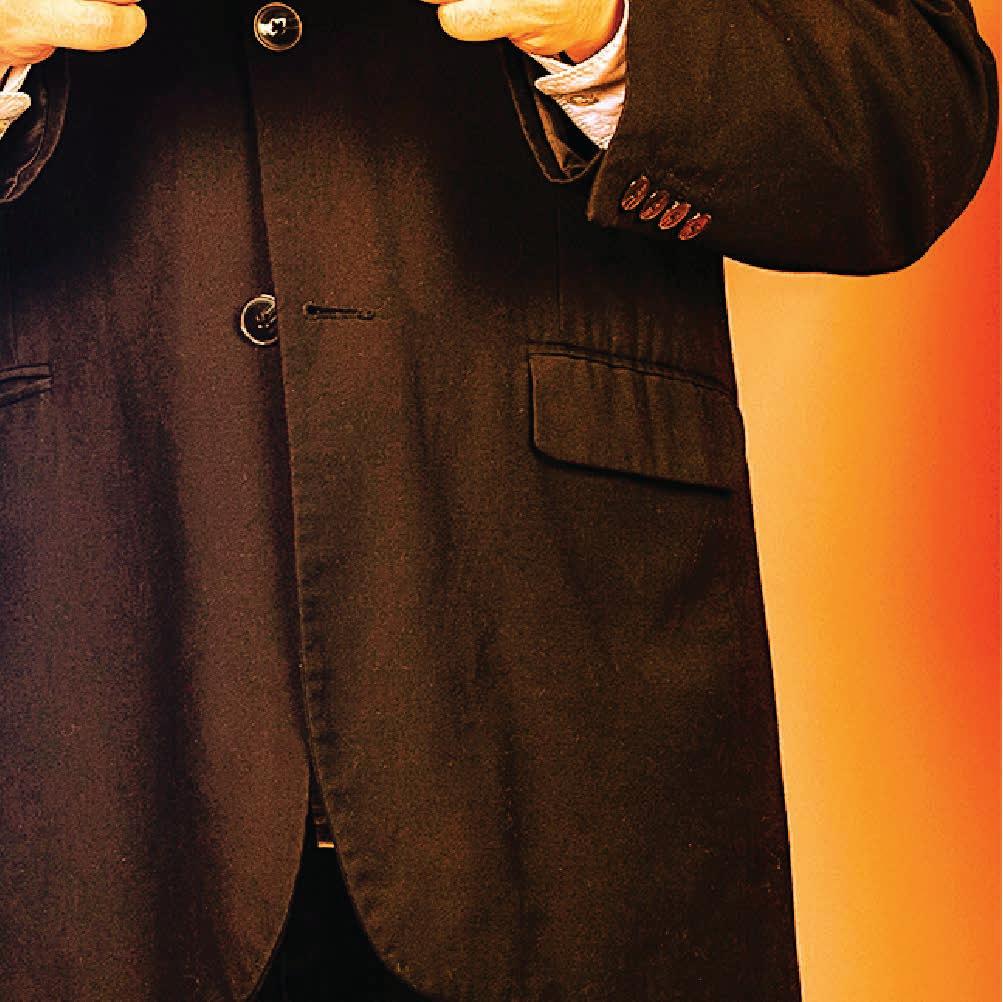



CONTINUED FROM PAGE 03

Ferd, Mary and Nancy used their “outside” activism to impact “inside” policy, including launching of the first intergovernmental AIDS Policy Committee in 1996, pooling resources of 40 city governments within LA County and organizing a national conference on Women with HIV/ AIDS at the Staples Center in 1997 featuring women of color with HIV/AIDS. And officially being a government o cial under a Republican mayor didn’t stop Nancy from stopping tra c at Wilshire Boulevard and Veteran in Westwood on Dec. 1, 1994 by sitting in the streets around burning co ns representing the AIDS dead — before being yanked away by her hair by an LAPD cop.
One of Ferd’s greatest achievements was convincing Mayor Richard Riordan that he should declare a state of emergency for the City of Los Angeles to suspend the drug paraphernalia law and to fund and enable Clean Needles Now to operate without harassment from law enforcement. By Ferd’s death in July 2007, the LA Times reported that CNN, “which annually serves about 12,000 people, removed more than 1 million potentially lethal syringes off the streets last year, according to figures from the city’s AIDS coordinator’s o ce.”
“There is no question in my mind that the program saved thousands and thousands of lives,” Mary told The Times. Mary took over as Interim City AIDS Coordinator for two years after Ferd retired on disability in 2001. She was the first woman to hold the job. (See a White Paper on the City’s AIDS efforts
here.) As the City noted in their statement on her passing: “She used tactics that confronted power outside of the system as part of ACT UP that carried on for the rest of her life. In 2002, she participated in a hunger strike to demand the lifting of federal prohibitions on the use of medical marijuana in the state of California. Yet at the same time, she worked within the government to ensure government responses had people like her in mind, and took her seat at the table to represent women like her in AIDS policy and planning.”
Mary and Nancy moved to Oceano where Mary’s vociferous challenging of town ocials won her a spot on the local community services board where she served two terms.
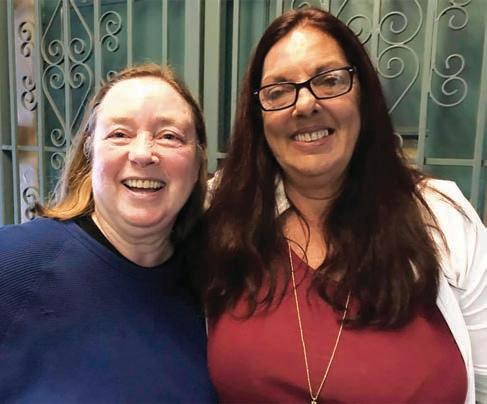
In 2021, the couple joined Jordan Peimer, Helene Schpak, and Judy Ornelas Sisneros in creating the ACT UP LA Oral History Project (see ACTUPLA.org). Meanwhile, Mary continued to participate in panels and Mary and Nancy occasionally ventured back to LA/WeHo for events such as “Lesbians to Watch Out For 90s ueer L.A. Activism.”
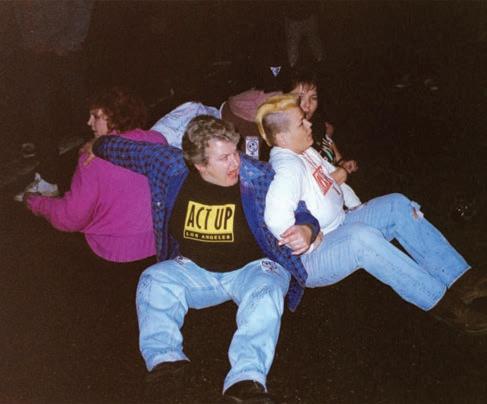
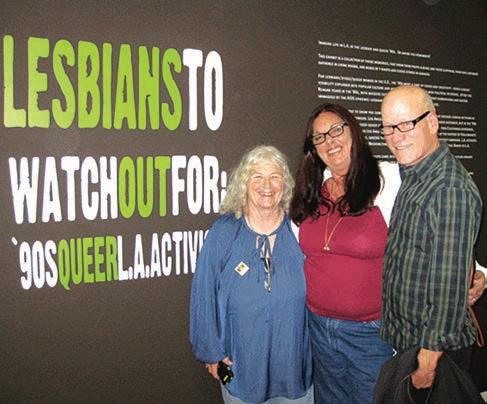
My last message from Mary was on Feb. 8 with a Facebook note after the death of my little dog Keely. “What a beautiful relationship the 3 of you had. Our hearts go out to you. Its hard to let go when you have the perfect team. Were thinking of you and Pepper.”
What a beautiful relationship you and Nancy had, as well. And here, look at us. We’re happy. Thank you for being my friend.

The chair of the Senate Committee on ducation, Senator Josh Newman introduced SB 760 last week, which requires all K-12 schools in California to provide appropriate and equitable access to all-gender restrooms for students to use during school hours.
“Schools should provide a safe and inclusive environment for all students, one where they’re able to focus on learning and where they’re encouraged to thrive academically, socially and emotionally,” said Newman (D-Fullerton). “Let’s face it— at some point during a typical 8-hour school day, everyone is going to have to go. By requiring all California K-12 schools to provide gender-inclusive restroom facilities on campus, we’ll ensure the well-being of our LGBTQ+ and non-binary students and ensure safer school communities for everyone.”
Under current law, although California schools must grant students access to restroom facilities consistent with their gender, schools are not explicitly required to provide gender-neutral restrooms. As a consequence, the frequent lack of easily accessed, explicitly gender-neutral restrooms at schools across the state remains problematic for students who do not identify with the traditional binary genders.
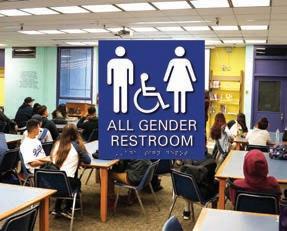
Survey data shows that 4 of LGBT and non-binary students actively avoid using gender-segregated school bathrooms because it makes them feel unsafe or uncomfortable. The lack of unstigmatized access to facilities appropriate to a student’s gender identity can cause not only emotional stress but physical harm as well, in the form of dehydration, urinary tract infections, or other health problems, not to mention the academic harm in the form of truancy and diminished grades on the part of students who miss or avoid school in response to those stresses.
“While states across the country are passing discriminatory policies attacking LGBTQ+ students, especially trans and non-binary youth, California is doubling down to ensure that schools are safe for all students to succeed,” said quality California xecutive Director Tony Hoang, a co-sponsor of SB 760. “SB 760 will ensure that students have access to an all-gender restroom without fear of harassment. We are grateful for the leadership
of Senator Newman and Superintendent Thurmond in championing this first-of-its-kind legislation to create a safe and supportive environment for all students.”
In response to growing concerns that some students are not able to safely access restrooms at schools, the California Department of Education (CDE) established the Safe School Bathrooms Ad Hoc Committee in November of 2021, comprised of California students, parents, school employees, CD staff, and other key stakeholders.
“Schools should be a welcoming, safe place for all students – this includes access to bathrooms,” said California State Superintendent Tony Thurmond, a co-sponsor of SB 760. “We’ve heard from our LGBTQ+ youth and through their leadership in conjunction with the work of our Safe School Bathroom committee, and we are pleased to sponsor this bill which will have California lead the nation by providing adequate access to gender-inclusive bathrooms on all campuses.”
Under SB 760, all K-12 schools statewide will be required to provide accessible all-gender bathrooms for students to use safely and comfortably. Specifically, SB 760 mandates that there be a su cient number of all-gender restrooms to accommodate all students who want to use them and that these restrooms remain unlocked during school hours.
“From seventh through ninth grade, I avoided using the bathroom at my school. Though I had not yet come out as transgender––even to my family–– I was uncomfortable using either the male or female restrooms. The only all-gender restroom at my school was exclusively for teachers, was kept locked, and was located behind the desks of administrative staff. To use that rest room I would have had to come out as transgender to the faculty—something I was not ready to do,” said Sam S., high school student, and a member of the Superintendent’s Safe School Bathroom Ad Hoc Committee. “LGBT youth often face bullying in school, and the lack of accessible all-gender restrooms makes school overtly unwelcoming, leading to increased rates of dropout, homelessness, and suicide. All California students deserve to access education with dignity.”
Some cities and school districts across the United States have
added gender-neutral bathrooms, however, Newman’s bill would make California the first to require it in schools statewide.
“Gender neutral restrooms are essential to show support for LGBTQ and non-binary youth,” said Senator Scott Wiener (D-San Francisco), coauthor of SB 760. “Every child and adolescent should have access to a bathroom that comports with their gender identity, and for some young people that means bathrooms that don’t force them to into a binary choice. This bill is a much needed step to promote inclusion in our schools.”
“Research across all domains of student wellbeing shows us that students – particularly queer and transgender students – having free use of a safe and accessible gender-inclusive restroom on their campus has a positive impact. Too often, students do not have access to inclusive facilities. These students suffer not only mental health risks, including depression, anxiety, lower grades, and increased suicidality, but also physical health risks, including chronic urinary tract infections, bladder infections, and more from avoiding restrooms. California can pave the way for protecting all students, particularly the LGBTQ+ community, and their fundamental right to privacy, safety, and access to inclusive restrooms,” said Benjamin K., post-graduate student, and member of the Superintendent’s Safe School Bathroom Ad Hoc Committee.
SB 760 is also co-authored by Senator Caroline Menjivar, Assemblymember Corey Jackson and Assemblymember Evan Low. If the bill is approved by committees throughout this legislative session, it will head to the Governor Newsom’s desk by the end of the summer.
FROM STAFF REPORTS
A new study from the Williams Institute at UCLA School of Law, conducted in collaboration with the Point Foundation, the nation’s largest LGBTQ scholarship nonprofit, finds more than twice as many LGBTQ POC as white LGBTQ adults report that unfair treatment at school due to being LGBTQ was a barrier to their academic success (10% vs. 4%).
Lifetime anti-LGBTQ bullying, harassment, and unfair treatment also kept them from getting the amount of education, training, or degrees that they wanted (15% vs. 7%).
Fewer LGBTQ people of color have completed a post-secondary degree or certificate by the age of 2 compared to their white LGBTQ peers (56% vs. 70%).
Using data from the Access to Higher Education Survey, a nationally representative study of adults ages 18 to 40, researchers examined the school experiences and higher education environments of LGBTQ people of color.
Results show that one-third (33%) of LGBTQ people of color received little or no information about college applications from high school counselors and teachers. More than onethird reported that they received little or no information about college entrance exams (41%), letters of recommendation (48 ), or financial aid (41%).
“Our research shows that more LGBTQ people of color experience bullying, harassment, and assault in community

college and four-year college than their non-LGBTQ peers of color, and at similar levels as white LGBTQ students. We also found that more LGBT people of color are first-generation college students and come from families that had fewer economic resources,” said lead author Kerith J. Conron, the Blachford-Cooper Distinguished Scholar and Research Director at the Williams Institute. “This means that colleges and universities need to improve educational environments and ensure that resources and support are in place for LGBTQ students of color—during the application process and upon admission.”
“Places of higher education are letting our students of color down,” said Jorge Valencia, Point Foundation Executive Director and CEO. “This study shows us that LGBTQ people of color are supported by their communities to achieve their educational dreams, but when they get there, students face mistreatment that hinders their mental health and ability to succeed. We need schools across the U.S. to make a stand for the success of our students of color.”
FROM STAFF REPORTS








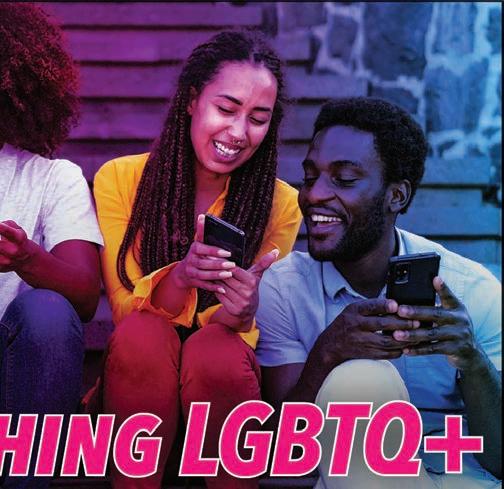


On issues from the curriculum taught in schools to trans Americans’ access to healthcare, Democrats should focus their messaging on how their opponents’ policy proposals would threaten personal freedoms, U.S. Rep. Becca Balint (D-Vt.) told the Washington Blade.
The Democratic Party’s tendency to get into the minutiae “doesn’t always serve us well,” as it is generally more effective to relay broader ideas about “this fundamental American concept of freedom” that elected Republicans are working to undermine, Balint said during an exclusive interview with the Washington Blade from her o ce on Tuesday.
“We don’t like being told what to do as Americans,” she said, adding that the message resonates regardless of whether folks identify as liberals or conservatives, or whether they live in rural or urban areas: “We don’t want to be told what we can and can’t learn about; what we can and can’t talk about.”
Government intrusion and overreach into otherwise private matters concerning healthcare and education has been a hallmark of policies enacted by GOP leaders like Florida’s Republican Gov. Ron DeSantis, a presumptive but still undeclared candidate for the 2024 presidential race.
Examples have included banning books with LGBTQ characters and themes, last month’s rejection of an advanced African-American studies course, and the Florida Board of Medicine’s adoption of a policy threatening the licenses of medical providers who administer guideline-directed interventions for trans and gender nonconforming youth.
In a video shared on Rumble last month, former president and declared 2024 Republican candidate Donald Trump pledged to weaponize the federal government against trans Americans if elected, such as by terminating the Medicare and Medicaid eligibility of hospitals and facilities that perform gender a rming care for minor patients.
“Ideas around equity and justice are things that we go to as Democrats,” Balint said. “But those aren’t necessarily the words that folks who identify as independents or Republicans use for the same kinds of ideas.”
The congresswoman said it is more effective to frame these debates as matters of “freedom and fairness as opposed to justice or equity or equality,” which is why she will “continue to say, ‘do you want more government intrusion?’”
So, with the presidential primaries looming, it will be important for Democrats to use this paradigm to discuss Republicans like DeSantis interfering with their healthcare, “picking on queer and trans kids and people who support them,” or targeting teachers who are living and working in their communities, Balint said.
The congresswoman, herself a former history teacher, noted that educators are among those figures who are “holding civic society together.”
Balint, who made history as Vermont’s first openly LGBT U.S. representative, said Democratic leaders including members of Congress must “be much more open about who we are.”
“If my colleagues across the aisle took a few minutes to talk to families who are raising trans kids right now,” Balint said, “they would understand…that their rhetoric is increasing levels of anxiety, and depression, and disconnection – and that’s not
the role of a public o cial.”
The e cacy of this strategy is underscored by the fact that anti-trans policies are based on lies. “Nothing about the rhetoric around trans Americans is based in reality,” Balint said. “It’s not based in the facts or the experiences of young people in this country.”
“When I talk about my life as a queer person, as a queer parent, as someone who is very open about my own mental health struggles, that gives other people permission to feel like they have a sense of place – in government, in their communities,” Balint said.
LGBT staffers on Capitol Hill have thanked Balint for speaking so openly about her identity, she told the Blade.
She said engaging in these discussions on personal terms can also be an effective way of reaching colleagues who, because they “have never had to deal with these issues,” have “learning curves.”
For example, Balint said, during the new Congress’s Jan. 7 swearing-in ceremony, she gently but firmly corrected another member for assuming her spouse in attendance was a man. After their exchange, the congressman found Balint again to apologize, promising that he will be sure never to repeat the mistake.
Balint hedged that other interactions have gone less smoothly. She said one of her main takeaways since arriving in Washington as a newly elected first-term member has been “the extent to which there are extremists within [the GOP],” which “is deeply disturbing to me as an American and certainly as somebody who’s a member of the LGBTQ community.”
Last week, House Republicans introduced a bill that would designate as America’s “national gun” the AR-1 style firearms used in deadly mass shootings, including the 2016 massacre at the former gay Orlando nightclub Pulse. Embattled gay GOP Rep. George Santos (N.Y.) is a co-sponsor of the legislation, which Balint characterized as “a political stunt” and an example of the kind of extreme rhetoric that makes violence more likely.
The congresswoman said moves like this messaging bill take “our focus away from helping people,” adding that helping people is “why I ran for o ce – to make life better, to alleviate suffering,” not to use rhetoric and talking points “to raise money.”
Given the high rate of suicide in Vermont, Balint said her work in Congress, including for the House Gun Violence Prevention Task Force, will be focused on matters like probing the relationships between gun violence, gun policy, and suicide, including among vulnerable populations like “people within the LGBTQ community who don’t feel like they have the support” they need.
A co-chair of the Congressional Equality Caucus and member of the Congressional Progressive Caucus, Balint has been appointed to serve on the powerful House Budget and Oversight & Accountability Committees.
Priorities for Balint will include the Equality Act, a landmark bill that would prohibit discrimination based on sexual orientation and gender identity in areas from employment and housing to jury service. A leading champion of the legislation, gay Rep. David Cicilline (D-R.I.), announced plans to retire in May, so Balint said she was talking with him last night “about how we make sure that work continues.”
“We have to continue to fight these battles and these issues, regardless of whether we think they’re going to be able to pass
this session,” she said, “because we have to queue it up for when [Democrats] are back in the majority.”
Other focus areas, she said, will be addressing the interrelated and ongoing housing and mental health crises in this country, as well as reproductive justice.
From 2015 to her swearing-in last month, Balint served as a Vermont state senator, including as majority leader and president pro-tempore. Unlike the U.S. House, Balint said, the Vermont Legislature “is pretty high functioning” with “a strong ability to work across the aisle.”
However challenging the calcified and polarized politics of Washington are by comparison, Balint noted there are moderate Republicans in the House. “We know because they were reaching out to members on our side saying, ‘we are not approving of what our leadership is doing around abortion issues.’”
For House Democrats, “it will be impossible for us in this moment to do anything” without the support of a few GOP members, which is a challenge because there are so few moderates in the party as a result of primary challenges from the far-right, Balint said.
Particularly in recent years and especially among Republicans, members of Congress have become bomb-throwers –prone to making outlandish and extreme statements, instigating and engaging in online spats with political opponents, and dehumanizing others.
Far-right Rep. Marjorie Taylor Greene (Ga.) has accused elected Democrats of “grooming” children for sexual abuse, compared COVID-19 mask mandates to the persecution of Jews during the Holocaust, and, before her election to Congress, supported calls to assassinate Democratic Party leaders.
Despite – or perhaps in some ways because – of this record, Greene is widely considered a rising star within her party, becoming a top ally of newly elected Republican House Speaker Kevin McCarthy, and, according to data from Open Secrets, raising more money during the 2022 election cycle than any other House Republican member except for McCarthy, House Majority Leader Steve Scalise (La.), Dan Crenshaw (Texas), and Jim Jordan (Ohio).
In this environment, amid the ceaseless attacks against them, Balint acknowledged the di culty for LGBT people and their allies to refrain from responding in kind. At the same time, she said, “I’m not somebody who’s going to continue to keep a fight going for the sake of the fight.”
From “how I post [on social media] to the way I deliver my oor speeches in the House ,” Balint said, “it is this signal even to people within my own party, that I’m not going to be a conict entrepreneur.”
Disagreements are bound to happen, and confrontation can be productive, the congresswoman said, but one must find the right approach and be mindful of the broader context.
Balint remains optimistic in the face of these challenges. She told the Blade she never imagined she would be able to marry the woman she loves, or raise two children, or be elected to serve as Vermont’s first openly LGBT member of Congress.
Nor, Balint said, did the framers envision “the child of an immigrant working class mom,” a queer woman, would have the privilege of serving in this role. But “now that I’m here, I’m going to make the most of it, and I’m going to fight on behalf of all of our freedoms.”




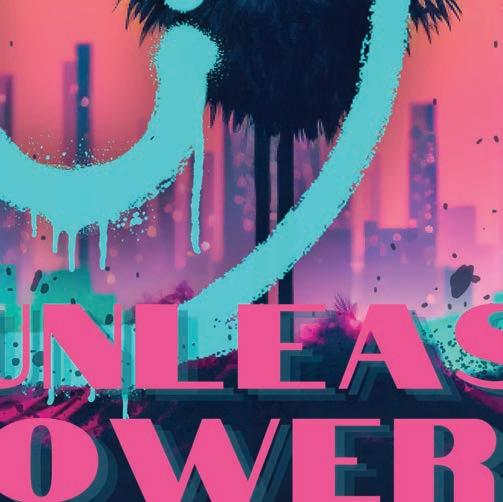


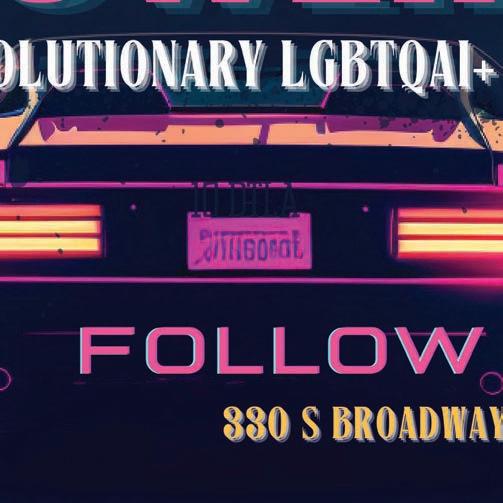
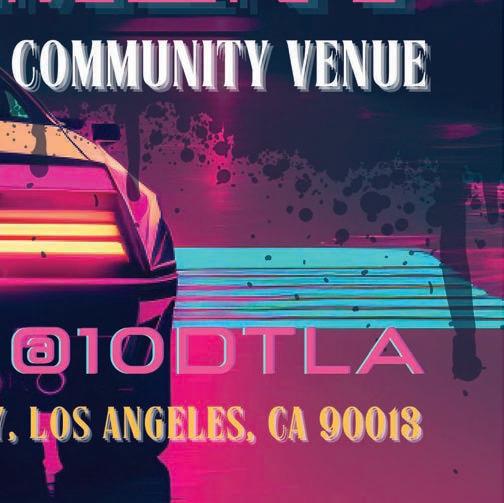
A standing ovation greeted the WNBA’s Brittney Griner over the weekend when the basketball star and her wife, Cherelle, stunned the audience by walking out onto the stage at the NAACP Image Awards in Pasadena, Calif.
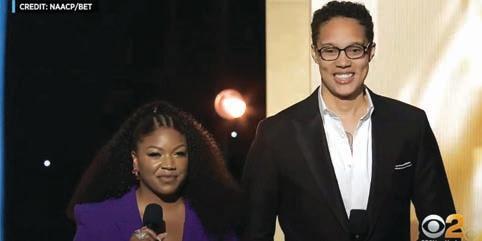
As Deadline reported, ueen Latifah was speaking about the resilience of Black people Saturday night, when she said, “We stay overcoming because that’s what we do!” Then, she introduced the Griners: “As we gather here tonight, In the spirit of overcoming adversity, I want to take this moment to recognize someone who has done just that.”
The crowd roared as they appeared on stage with broad smiles, holding hands. Brittney wore an elegant black tuxedo and unbuttoned button-down white shirt, with Cherelle decked out in a regal purple pantsuit.
“It feels so good to be here,” said Griner, “especially with my beautiful, amazing wife and with all of y’all here today.”
“Thank you for that beautiful applause,” Cherelle Griner said. “We are just truly so thankful to all the people, many of whom are Black women and Black-led organizations who fought so hard to bring BG home tonight.”
The Phoenix Mercury player, who just re-signed with the team this month, regained her freedom in December 2022 in a prisoner swap between Russia and the U.S.
The 32-year-old missed the entire 2022 season following her arrest in Moscow one year ago. Russian authorities said she broke their law by packing vape canisters with cabbabis oil in her luggage. In August, Griner was sentenced to nine years in a penal colony for drug smuggling, and that sentence was upheld upon appeal in October.
Griner was finally exchanged in the United Arab mirates for Russian arms dealer Viktor Bout. He had served 10 years of a 25-year-sentence for conspiring to sell weapons to a terrorist group. Russia balked at the Biden administration’s request to secure the release of businessman and former U.S. Marine Paul Whelan, who is still serving a 16-year prison sentence in Russia for spying.
“Let’s keep fighting to bring home every American still detained overseas,” Griner told the audience at the award ceremony.
As NPR reported, almost three dozen Americans are wrongfully detained by foreign governments each year, a rate nearly seven times greater than the average compared to just ten years ago, according to a study by the James W. Foley Legacy Foundation. That group advocates for the release of Americans who are held hostage or wrongfully detained.
According to the foundation, right now there are at least 60
Americans who are currently being held hostage or wrongfully detained in foreign countries. Iran, China, Venezuela, Syria and Russia are holding the vast majority of those Americans prisoner.
Griner and the Phoenix Mercury open their 2023 season against the Los Angeles Sparks at the Crypto.com Arena on May 19. The team’s first home game is May 21 when Phoenix hosts the Chicago Sky.
Republican Mississippi Gov. Tate Reeves on Tuesday signed House Bill 1125, a bill banning health care treatments for gender dysphoria for transgender youth, prohibiting doctors from providing such care and stripping parents of the right to guide medical decisions for their own children.
The American Civil Liberties Union and the American Civil Liberties Union of Mississippi issued the following statement:
“This is a devastating development for transgender youth in Mississippi and heartbreaking for all of us who love and support them. This care was already di cult to access across the state for transgender people of any age, but this law shuts the door on best-practice medical care and puts politics between parents, their children and their doctors. But this fight is far from over — we are determined to build a future where Mississippi is a safe place to raise every child. Our politicians continue to fail trans youth, so
it is up to each and every one of us to rise against their fear and ignorance and surround these young people with strength, safety and love.”
Mississippi is the fifth state in the country and the third state in the past month to ban gender-a rming care for trans youth after Utah and South Dakota passed similar bans. Similar laws in Alabama and Arkansas are currently enjoined by federal courts.
U.S. House Democrats reintroduced a resolution on Friday that would recognize the contributions of Black LGBT I leaders.
The proposal “Recognizing Black History Month as an important time to celebrate the remarkable and unique contributions of all LGBT I Black Americans in United States history” was sponsored by U.S. Rep. Barbara Lee (Calif.), a founding member and current vice chair of the Congressional quality Caucus.
Co-sponsors included the Caucus’s Chair, Rep. Mark Pocan (Wis.), and fellow Vice Chair, Rep. Ritchie Torres (N.Y.), along with 29 other House Democrats. In addition to the Caucus, the resolution has been endorsed by quality California, America’s largest statewide LGBT organization.
“For generations, we have seen the erasure of Black LGBT I Americans from our history, despite all of the rich and impactful contributions these individuals have made to our culture, society, and the advancement of civil rights,” Lee said in a press release announcing the move.
“As we celebrate Black History Month, we must pay homage to remarkable Black LGBT I figures like Marsha P. Johnson, James Baldwin, Audre Lorde, Bayard Rustin, and many more,” Lee said. “I’m proud to reintroduce this resolution with
my quality Caucus colleagues to honor their legacies and ensure our history is told in full.”
The bill also recognizes more recent achievements by Black LGBT leaders, including Minneapolis City Councilmember Andrea Jenkins, who became the country’s first transgender woman to serve in public o ce in 2018 Lori Lightfoot, who became Chicago’s first LGBT and first Black woman mayor
FROM STAFF REPORTSin 2019 and Karine Jean-Pierre, who in 2022 became the first Black woman and the first LGBT person to serve as White House press secretary.
Black advocates who are now leading LGBT advocacy groups were also spotlighted in the bill Kelley Robinson at the Human Rights Campaign Imani Rupert-Gordon at National Center for Lesbian Rights Kierra Johnson at National LGBT Task Force David Johns at National Black Justice Coalition Gabriel Foster at Trans Justice Funding Project Carter Brown at Black TransMen Inc. Melanie Willingham-Jaggers at GLS N and Stacey Stevenson at Family quality Council.
“I’m honored to be included on this list of trailblazing Black LGBT leaders. I love Black History Month, because it’s a time when people in our country come together not just to honor the Black past but also to build Black futures and celebrate Black joy,” Robinson said in an exclusive statement to The Washington Blade.
“Right now, with attacks on Black and LGBT lives on the rise, it is more important than ever that we hold onto that Black, queer joy and I’m proud that Rep. Barbara Lee and the other resolution sponsors have taken this moment to make that clear,” she said.
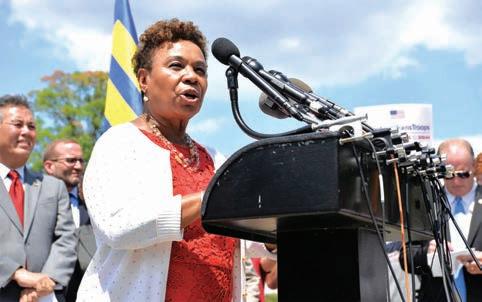 CHRISTOPHER KANE
DAWN ENNIS
CHRISTOPHER KANE
DAWN ENNIS
ss s e er r he lth c re or tr s youth





With over 900,000 members, Equality California is the nation’s largest statewide LGBTQ+ civil rights organization and California’s only LGBTQ+ civil rights organization working at the local, state and national levels.
We strive to create a world that is healthy, just, and fully equal for all LGBTQ+ people. We advance civil rights and social justice by inspiring, advocating, and mobilizing through an inclusive movement that works tirelessly on behalf of those we serve.
We’re fighting for full LGBTQ+ equality and YOU can join us! Your membership allows us to:
∂ Pass pro-equality legislation in California and Washington, DC
∂ Elect pro-equality champions up and down the ballot
∂ Fight for LGBTQ+ civil rights and social justice in the courtroom
∂ Reduce disparities in LGBTQ+ health and well-being











∂ Develop a pipeline of LGBTQ+ leaders

∂ Increase civic participation and building political power within the LGBTQ+ community
Your support matters! Join us today: eqca.org/join

Australian Prime Minister Anthony Albanese made history Saturday at Sydney’s Gay and Lesbian Mardi Gras parade, becoming his nation’s first sitting prime minister to take part in the parade, one of the biggest LGBT Pride events in the world.
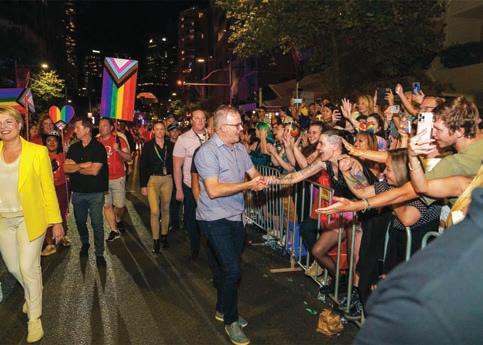
The prime minister in a simple open-necked shirt and jeans joined senior Labor figures — including the New South Wales opposition leader, Chris Minns, and the federal MP for Sydney, Tanya Plibersek, drawing cheers from the huge crowds lining the city’s Oxford Street as more than 12,000 participants and 200 oats made their way along the parade route.
Penny Wong, the first openly lesbian member of Australia’s parliament, also took part in the celebrations.
On Twitter Albanese noted “When the first Mardi Gras march was held in 1978, you could still be arrested for be-
ing gay. In the decades since, people dedicated their lives toward the campaign for equality.” Continuing in the thread the prime minister added “To be accepted as equal and recognized for who they are and who they love. I’ve been proudly marching in Mardi Gras since the 80s. This year I’m honored to be the first prime minister to join the march.”
This was Sydney’s first Gay and Lesbian Mardi Gras since the coronavirus pandemic, the last one was held in 2019.
Speaking to reporters Albanese said “This is a celebration of modern Australia,” adding that it was “unfortunate” that he was the country’s first leader to march in the parade while in o ce.
“People want to see that their government is inclusive and represents everyone no matter who they love, no matter what their identity, no matter where they live.”
BRODY LEVESQUEThe first transgender female anchor on the independently owned and operated Kohenoor News Network in Pakistan escaped serious injury after two gunmen opened fire as she was returning to her residence after a trip to a local pharmacy.

Marvia Malik, who had made history in the conservative Muslim-majority nation as the first openly trans person on a television channel in 2018, told police investigators that she believed her LGBT and intersex rights activism was a “major factor” behind the assassination attempt, citing several threatening calls prior to Feb. 24’s attempt on her life.
Malik, who had moved out of Lahore, fearing for her safety based on previous threats, had returned for a surgery only days before the attempt on her life happened.
LGBT and intersex rights in Pakistan are still severely restricted with homosexuality being outlawed, punishable by prison sentences and conversion therapy is often a prescribed treatment.
The community, however, continues to face many challeng-
es in Pakistan. They experience discrimination and violence both from individuals and the government.
In 2018, for example, the Pakistani government passed a law under Section 377 of the country’s colonial-era penal code that made same-sex marriage punishable by up to 10 years in prison. Homosexuality remains criminalized in Pakistan.
In addition to the criminalization of LGBT and intersex Pakistanis, the community also continues to face discrimination and violence that family members often perpetuate.
Many LGBT and intersex people face verbal, emotional and even physical abuse from their families due to societal and religious pressures. This can lead to them dropping out of school or foregoing higher education altogether.
Discrimination in the workplace and education system forces many LGBT and intersex Pakistanis to remain in the closet, and those who are out often cannot find work or continue their education. Access to health care — including testing and treatment for sexually transmitted diseases and infection — is an ongoing challenge.
A law that permits trans people to legally change the gender on their national ID cards and other o cial documents, allows them to vote and bans discrimination based on gender identity in employment, health care, education and on public transportation took effect in 2021. Pakistan’s Supreme Court in 2009 ruled in favor of recognizing trans people as a third gender on identity cards. Discrimination against trans Pakistanis remains pervasive in spite of these advances.
In an interview with fashion magazine lle, Malik, then 21,
who had previously worked as a model noted that she moved in with a trans friend and earned a Bachelor of Arts degree in journalism and civics from Lahore’s Punjab University, while studying make-up and working at a local salon to support herself.
Upon graduation, she began looking for jobs — and landed her first and current one with Kohinoor News, a small Lahore-based TV channel, after passing her screen test with ying colours. “At my interview, they asked, ‘Why are you interested in working here? Don’t transgender people just beg and dance for money?’”
After three months of training, she began her career on March 23, 2018, and news of her employment went viral she told the worldwide women’s magazine.
“Like other trans people, I did not get any support from my family. On my own, I did some menial jobs and continued my studies. I had always wanted to be a news anchor, and my dream came true when I got selected,” she said to Voice of America in a interview.
Speaking with the BBC she said “Our community should be treated equally and there must not be any gender discrimination. We should be given equal rights and be considered ordinary citizens, instead of third-gender.”
She added “My family knows I have modelled and they know that I work as a newscaster. It’s the age of social media and there’s nothing that my family doesn’t know. But they have still disowned me.”
A South Korean high court ruled this week that partners in a same-sex relationship are eligible for national health insurance coverage overturning a ruling last year by a lower court that denied the benefits.
The Korea Herald reported the Seoul High Court’s ruling is the first that recognizes the status of a same-sex partner as a dependent eligible for national health insurance, but noted that this did not mean that it recognizes the “legal status” of a same-sex marriage.
The lower court had ruled that “the union of a man and woman is still considered the fundamental element of marriage, according to civil law, precedents of the Supreme Court
and the Constitutional Court and the general perception of society.”
The lower court had also added “Under the current legal system, it is di cult to evaluate the relationship between two people of the same sex as a common-law relationship.”
The case was brought about by a lawsuit, filed last year by So Seong-wook, which challenged South Korea’s National Health Insurance Service after it took away his ability to receive spousal benefits from the employer of his partner Kim Yong-min.
According to the Korea Herald, the NHIS allowed Kim to register So as his dependent in early 2020 — later reversing the decision citing their same-sex marriage. It was believed to be
the first such case in the country.
In the lawsuit, So claimed he and his partner were discriminated against because the NHIS grants spousal coverage to common-law partners, often used by opposite-sex couples who are not married.
In this week’s ruling by the high court it stated “The plaintiff and his partner are both male, but they agreed to recognize each other as loving partners who take care of each other. One financially relies on the other. They declared their partnership before their families and friends. This makes their relationship no different in essence from that of a married couple.”
BRODY LEVESQUE

Growing up in Syria, life was relatively stable — until it wasn’t. My world turned upside-down in 2011 when civil war ravaged the country, separating families, destroying buildings, schools and parks and displacing millions of innocent people who were forced to begin life anew in strange lands with virtually no supportive services.
I remember seeing videos of queer people being thrown from the top of buildings in areas controlled by ISIS and similar groups. Life was never easy for queer people in Syria to start with, but threats to one’s life grew exponentially amid the chaos and rise of religious extremists. I was closeted at the time; a young doctor eager to start a career in saving lives. I remember hearing the sounds of sirens, gunshots and blood-curdling screams echoing from a distance, and realizing that I had no choice but to ee.
This is the reality for many LGBTQ+ people seeking asylum in the United States who are escaping countries where homosexuality is criminalized, but what many Americans don’t realize is that seeking asylum isn’t as easy as filling out paperwork. The current asylum process is a tangled web of bureaucracy, politics, and legal barriers that traps asylum seekers in limbo for years.
In the U.S. today, there are 1.6 million people with pending asylum cases. Among them are doctors, students and other professionals who ed war, violence and persecution in search of safety. Now that they have found it, they face up to a 6-year waiting period before learning their fate. Asylum is a notoriously complex and discretionary system. Each case is determined on its merit by the subjective opinion of the presiding judge or immigration o cer. Unfortunately, many applicants lack adequate representation, and more than half of asylum cases are denied each year. Tens of thousands struggle with coming out and living their truth against the threat of potential deportation, should their case be denied years later.
While a process to vet cases has to exist, there is no reason it should take this long. The system wasn’t always like this. In fact, over the course of a decade, the backlog in asylum applications increased seven fold — from 100,000 in 2012 to nearly 788,000 by the end of 2022.
At best, the current system is a careless abdication of responsibility by our government. At worst, it is intentionally weapon-
ized to discourage asylum seekers from coming to the United States. This is unacceptable in a country that prides itself on being a beacon of hope and opportunity, which I know firsthand. I credit my ability to freely live life as my authentic self to the ideals this country is built upon. It is our duty to ensure all asylum seekers have the same opportunity.
Last week, I celebrated my 10-year anniversary of moving to the U.S. Five years ago, I became an American citizen. It wasn’t until that point that I felt I could finally embrace my true identity. I was fortunate to have pre-existing familial ties to the U.S., which helped me bypass the complicated asylum system, but many of my queer siblings don’t have that luxury.
Since moving to the U.S., I’ve been plagued by survivor’s guilt. Three of my medical school classmates lost their lives, and some are still missing to this day. Why them, and not me? I’ve often wondered. The news of the 7.8 magnitude earthquake that hit Syria and Turkey earlier this month, killing over 46,000 people to date, triggered many memories I thought I had long buried deep. It has also reminded me that, despite the hell I’ve been through, I made it to the other side whole. I never had the chance to be whole before calling the United States my home. Other people who were forcibly displaced, like me, deserve the same.
I want the images of destroyed buildings and the sounds of falling bombs to be replaced in their minds by those of Pride parades and drag shows — as it was for me. I want them to experience the excitement of holding another person’s hand without looking over their shoulders in angst. I want them to know what it’s like to celebrate their first Valentine’s Day with the person they love, a milestone I recently achieved this year for the first time.
This is what I fight for, and what every American should fight for.
I am unrecognizable from the person who stretched his shaky hands to give his Syrian passport to the CBP agent at Boston’s Logan Airport a decade ago. I am now an openly gay D IB professional, human rights and LGBTQ+ advocate who is in a loving relationship. I am now a proud American citizen and a living testament to the power of compassion. It is our responsibility to ensure that the same opportunity is afforded to all those seeking asylum in the United States. The time for change and to fix our broken asylum system is now.
ADDRESS
8237 Blackburn Avenue Ste. 201, Los Angeles, CA 90048
PHONE 310-230-5266
E-MAIL tmasters@losangelesblade.com
INTERNET losangelesblade.com
PUBLISHED BY Los Angeles Blade, LLC
PUBLISHER
TROY MASTERS
tmasters@losangelesblade.com
310-230-5266 x8080 (o), 917-406-1619 (c)
SALES & MARKETING
SALES EXECUTIVE
CHRIS WILMORE
cmwilmore@losangelesblade.com
310-230-5266 x9461
NATIONAL ADVERTISING
RIVENDELL MEDIA
sales@rivendellmedia.com, 212-242-6863
MARKETING DIRECTOR
STEPHEN RUTGERS
srutgers@washblade.com, 202-747-2077 x8077
EDITORIAL
CONTRIBUTING WRITER
KAREN OCAMB
karenocamb@losangelesblade.com
NATIONAL EDITOR
KEVIN NAFF
kna @washblade.com, 202-747-2077 x8088
EDITOR AT LARGE BRODY LEVESQUE
California
CONTRIBUTORS
MICHAEL K. LAVERS, TINASHE CHINGARANDE, ERNESTO VALLE, YARIEL VALDÉS GONZALEZ, PARKER PURIFOY, CHRISTOPHER KANE, AUSTIN MENDOZA, JOHN PAUL KING, JOEY DIGUGLIELMO, CHRIS JOHNSON, LOU CHIBBARO JR., REBEKAH SAGER, JON DAVIDSON, SUSAN HORNIK, CHANNING SARGENT, SAMSON AMORE, CHRISTOPHER CAPPIELLO, MICHAEL JORTNER, DAN ALLEN, SEAN SHEALY, SCOTT STIFFLER, RHEA LITRÉ CREATIVE DESIGN/PRODUCTION AZERCREATIVE.COM
DISTRIBUTION
CHRISTOPHER JACKSON, 562-826-6602
All material in the Los Angeles Blade is protected by federal copyright law and may not be reproduced without the written consent of the Los Angeles Blade. e sexual orientation of advertisers, photographers, writers and cartoonists published herein is neither inferred nor implied. e appearance of names or pictorial representation does not necessarily indicate the sexual orientation of that person or persons. Although the Los Angeles Blade is supported by many ne advertisers, we cannot accept responsibility for claims made by advertisers. Unsolicited editorial material is accepted by the Los Angeles Blade, but the paper cannot take responsibility for its return. e editors reserve the right to accept, reject or edit any submission. A single copy of the Los Angeles Blade is available from authorized distribution points, to any individual within a 50-mile radius of Los Angeles, CA. Multiple copies are available from the Los Angeles Blade o ce only. Call for rates. If you are unable to get to a convenient free distribution point, you may receive a 26-week mailed subscription for $195 per year or $5.00 per single issue. Checks or credit card orders can be sent to Phil Rockstroh at prockstroh@washblade.com.
Postmaster: Send address changes to the Los Angeles Blade, PO BOX 53352 Washington, DC 20009. e Los Angeles Blade is published bi-weekly, on Friday, by Los Angeles Blade, LLC. Rates for businesses/institutions are $450 per year. Periodical postage paid at Los Angeles, CA., and additional mailing o ces. Editorial positions of the Los Angeles Blade are expressed in editorials and in editors’ notes as determined by the paper’s editors. Other opinions are those of the writers and do not necessarily represent the opinion of the Los Angeles Blade or its sta To submit a letter or commentary: Letters should be fewer than 400 words; commentaries should be fewer than 750 words. Submissions may be edited for content and length, and must include a name, address and phone number for veri cation. Send submissions by e-mail to tmasters@losangelesblade.com. ©2023 LOS ANGELES BLADE, LLC.
I ed Syria and came out after receiving refuge in U.S.
is a Syrian American immigrant and human rights advocate. A doctor by training, he works as a DEIB leader and consultant. Follow him @Basel_Touchan.
is a longtime LGBTQ rights and Democratic Party activist. He writes regularly for the Blade.


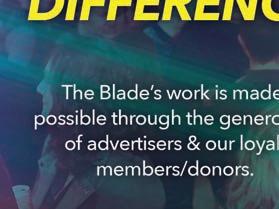
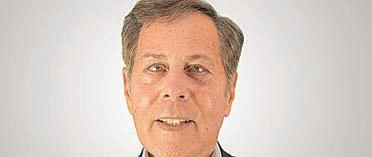
I had the honor of working in the Carter administration. It was not something I even thought about when he won the presidency in 1976.
Sen. Henry ‘Scoop’ Jackson (D-Wash.) won the New York Democratic primary, but his campaign was faltering. Then-Mayor Abe Beame endorsed Jimmy Carter. Beame was the fourth big city mayor to do so, but his being Jewish made his endorsement all the more important. The year 1976 was also when Rep. Bella Abzug (D-N.Y.) was running in a Senate primary and I volunteered in her campaign. At the time, I was Citywide Coordinator Local Government in the Mayor’s O ce of Neighborhood Services. It was an interesting time. I attended the Democratic National Convention, held in New York, and saw Carter nominated. Abzug then lost her primary, in a close race, to Patrick Moynihan.
As the general election began, I was asked to be one of the liaisons to the Carter campaign from the mayor’s o ce. I spent many evenings, on my own time, in Carter’s New York campaign o ce. ven after he won, I never thought about serving in his administration and was very happy working in New York. But as anyone in politics can tell you, things often change quickly.
In 1977, Abzug decided to run for mayor. I ended up leaving the Beame administration to become her deputy campaign manager. It was the title she offered me to leave Beame, who was running for re-election. Bella and Beame both lost in the first round of the primary. The run-off was between Mario Cuomo and d Koch. My first and only mention on the front page of the New York Times, above the fold left hand column, was when I went to work as field director for Cuomo. When Koch won, he let me know through an intermediary I was persona non grata in city government as long as he was mayor.
Abzug invited me to go with her to the White House when she presented the final report from the Houston Women’s Conference to the president. Being unemployed, I walked around the White House handing out my resume; we still used paper in those days. Abzug kept whispering in my ear, “don’t you dare give it to the president.” Well not the president, but one of the people I gave it to, did respond. Six weeks later I was hired to be executive direc-
tor of the White House Conference on Handicapped Individuals Implementation Unit. So I moved to Washington to begin an exciting two years. Turned out it was the beginning of a whole new life for me, including coming out. I never looked back.
During his campaign, Carter had promised to implement the recommendations of the White House Conference on the Handicapped held during the Ford administration. Carter, above all else, was a decent man. In so many ways his presidency is underrated and he doesn’t get the credit he should.
Kai Bird wrote in the New York Times about a host of Carter’s successes. “He delivered the Camp David peace accords between gypt and Israel, the SALT II arms control agreement, normalization of diplomatic and trade relations with China and immigration reform. He made the principle of human rights a cornerstone of U.S. foreign policy, planting the seeds for the unraveling of the Cold War in astern urope and Russia.” In addition, “He deregulated the airline industry, paving the way for middle-class Americans to y for the first time in large numbers, and he deregulated natural gas, laying the groundwork for our current energy independence. He worked to require seatbelts or airbags, which would go on to save 9,000 American lives each year. He inaugurated the nation’s investment in research on solar energy and was one of the first presidents to warn us about the dangers of climate change. He rammed through the Alaska Land Act, tripling the size of the nation’s protected wilderness areas. He appointed more African Americans, Hispanics and women to the federal bench, substantially increasing their numbers.”
Jimmy Carter was only a one-term president. Today, he is known for having the most relevant post-presidency. He lost his reelection campaign for many reasons. One, Ted Kennedy ran against him in a primary and though losing, hurt Carter’s chances for reelection. Then the Iranian hostage crisis, which lasted for 444 days and Carter’s Rose Garden strategy, not going out and campaigning until the hostages were released. The Iranians didn’t release them until 12:01 on the day Ronald Reagan was inaugurated. Again, above all, Jimmy Carter will be remembered as a decent and honorable man.
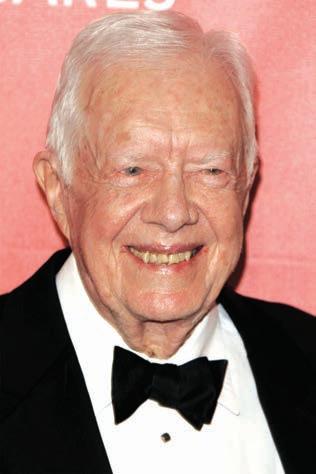
SkivviesDallas.net

Shop now for exciting, sexy new styles in men’s underwear, swimwear, athleticwear, partywear, fetish wear, harnesses, casual clothing, & much more!



Shop online today at www.SkivviesDallas.net

The 29th annual Screen Actors Guild Awards was a star-studded party like no other — giving you excitement, unexpected reunions, intimate moments onstage and off and a palpable sense of community.
It’s the only show that exclusively honors actors. With a voting body of more than 122,600 members, the SAG Awards have the largest and most diverse group of voters in the awards circuit.

According to the Hollywood Reporter “Everything Everywhere All at Once” was the big winner at Sunday night’s 29th annual Screen Actors Guild Awards.
Michelle Yeoh and Jamie Lee Curtis won best lead actress and best supporting actress for “ verything verywhere All at Once,” respectively. And their co-star Ke Huy uan also was a winner, noting that he is now the first Asian actor to win the SAG Award for best supporting male when accepting his award.
Brendan Fraser won best lead actor for “The Whale.”
On the TV side, the cast of “Abbott lementary” was named best comedy series ensemble, while “The White Lotus” cast won the award for best TV drama series ensemble.
Following is the list of nominees and winners:
Outstanding Performance by a Female Actor in a Leading Role
Cate Blanchett, “T r”
Viola Davis, “The Woman King”
Ana de Armas, “Blonde”
Danielle Deadwyler, “Till”
Michelle Yeoh, “ verything verywhere All at Once” (WINN R)
Outstanding Performance by a Male Actor in a Supporting Role
Paul Dano, “The Fabelmans”
Brendan Gleeson, “The Banshees of Inisherin”
Barry Keoghan, “The Banshees of Inisherin”
Ke Huy uan, “ verything verywhere All at Once” (WINN R)
ddie Redmayne, “The Good Nurse”
Outstanding Performance by a Female Actor in a Supporting Role
Angela Bassett, “Black Panther: Wakanda Forever”
Hong Chau, “The Whale”
Kerry Condon, “The Banshees of Inisherin”
Jamie Lee Curtis, “Everything Everywhere All at Once” (WINN R)
Stephanie Hsu, “Everything Everywhere All at Once”
Outstanding Action Performance by a Stunt Ensemble in a Motion Picture
“Avatar: The Way of Water”
“The Batman”
“Black Panther: Wakanda Forever”
“Top Gun Maverick” (WINN R)
“The Woman King”
Outstanding Performance by an Ensemble in a Drama Series
“Better Call Saul”
“The Crown”
Outstanding Performance by a Cast in a Motion Picture
“Babylon”
“The Banshees of Inisherin”
“ verything verywhere All at Once” (WINN R)
“The Fabelmans”
“Women Talking”
Outstanding Performance by a Male Actor in a Leading Role
Austin Butler, “ lvis”
Colin Farrell, “The Banshees of Inisherin”
Brendan Fraser, “The Whale” (WINN R)
Bill Nighy, “Living”
Adam Sandler, “Hustle”
“Ozark”
“Severance”
“The White Lotus” (WINN R)
Outstanding Performance by a Male Actor in a Drama Series
Jonathan Banks, “Better Call Saul”
Jason Bateman, “Ozark” (WINN R)
Jeff Bridges, “The Old Man”
Bob Odenkirk, “Better Call Saul”
Adam Scott, “Severance”
Outstanding Performance by a Female Actor in a Drama Series
Jennifer Coolidge, “The White Lotus” (WINN R)
Elizabeth Debicki, “The Crown”
Julia Garner, “Ozark”
Laura Linney, “Ozark”
Zendaya, “Euphoria”
Outstanding Performance by an Ensemble in a Comedy Series
“Abbott lementary” (WINN R)
“Barry”
“The Bear”
“Hacks”
“Only Murders in the Building”
Outstanding Performance by a Male Actor in a Comedy Series
Anthony Carrigan, “Barry”
Bill Hader, “Barry”
Steve Martin, “Only Murders in the Building”
Martin Short, “Only Murders in the Building”
Jeremy Allen White, “The Bear” (WINN R)
Outstanding Performance by a Female Actor in a Comedy Series
Christina Applegate, “Dead to Me”
Rachel Brosnahan, “The Marvelous Mrs. Maisel”
uinta Brunson, “Abbott lementary”
Jenna Ortega, “Wednesday”
Jean Smart, “Hacks” (WINN R)
Outstanding Performance by a Male Actor in a Television Movie or Limited Series
Steve Carell, “The Patient”
Taron Egerton, “Black Bird”
Sam lliott, “1883” (WINN R)
Paul Walter Hauser, “Black Bird”
van Peters, “Dahmer — Monster The Jeffrey Dahmer Story”
Outstanding Performance by a Female Actor in a Television Movie or Limited Series
Emily Blunt, “The English”
Jessica Chastain, “George Tammy” (WINN R)
Julia Garner, “Inventing Anna”
Niecy Nash-Betts, “Dahmer — Monster The Jeffrey Dahmer Story”
Amanda Seyfried, “The Dropout”
Outstanding Action Performance by a Stunt Ensemble in a Television Series “Andor”
“The Boys”
“House of the Dragon”
“The Lord of the Rings: Rings of Power” “Stranger Things” (WINN R)

For Oscar handicappers – or anyone else who loves movies and enjoys playing the yearly game of picking favorites and predicting winners during Hollywood’s glitzy awards season – last weekend’s presentation of the Screen Actors Guild Awards was a crucial event.
As the last “big” awards ceremony before Academy Award night (which takes place this year on March 12), the SAG Awards’ film category winners are often seen as a clear indicator of which films and performers have the momentum to win there, too. It’s not surprising they should be seen as significant, but this year, thanks to some history-making wins (including firsts for Asian-American talent and a single movie’s sweep of all but two of the film categories), there was even more reason to pay attention.
SAG was not the only organization to bestow its film awards last week, however. Though they received less fanfare, the 14th Annual Dorian Awards – announced on Feb. 23 by GALECA, the Society of LGBTQ Entertainment Critics – offered a slate of winners that re ected a queer eye on the films of 2022; and while they might not be as much a barometer for the tastes and attitudes of the industry insiders who vote for the big film awards, it should be noted that its choices align surprisingly often with those of SAG and the rest of mainstream Hollywood.
That’s partly because, although they do include a handful of LGBT -specific categories, the Dorians don’t just honor queer films. GAL CA’s voters – a group of more than 400 professional queer entertainment critics, journalists, and media
icons – look at the same movies as their straight colleagues; they present the Dorians (named as a nod to iconic queer writer Oscar Wilde and his most famous literary creation) as a way “to remind bigots, bullies and our own communities that the world often looks to the eye for unique and powerful entertainment,” and to ensure that a queer perspective is represented amid Hollywood’s yearly bestowal of honors. While there have been notable divergences, such as the occasional queer title like “Carol” or “Call Me By Your Name” supplanting their more hetero-friendly competitors for Film of the Year, recent Dorian honors have tended more to mirror the mainstream consensus than defy it.
This year is no exception. “Everything Everywhere All at Once,” the genre-splicing serio-comic sci-fi sleeper whose jaw-dropping sweep at the SAG show has made a similar triumph at the Oscars feel all but inevitable, also scored a lion’s share of honors from the Dorians, winning in seven of its nine nominated categories – even achieving the triple feat of being chosen as Best Film, Best LGBTQ Film and Most Visually Striking Film. For Lead Film Performance – all nominees, regardless of gender, vie for a single award in the each of the two acting categories – Yeoh, long embraced by queer fans, edged out not only Blanchett but favored male competitors like SAG winner Brendan Fraser and Golden Globe winners Colin Farrell and Austin Butler, while co-star Ke Huy Quan continued his inspiring victory lap by being chosen for Supporting Film Performance. Rounding out their movie’s tally, filmmakers Daniel Kwan and Daniel Scheinert won in both the Director
and Screenplay categories. As a bonus, while technically awarded for “ AAO,” Yeoh was also the winner of the Wilde Artist Award, a special Dorian given yearly “to a truly groundbreaking force in film, theater and/or television,” and fellow cast member Stephanie Hsu was named as Rising Star of the Year – honors almost certainly fueled by their work in “EEAAO.”
In other categories:
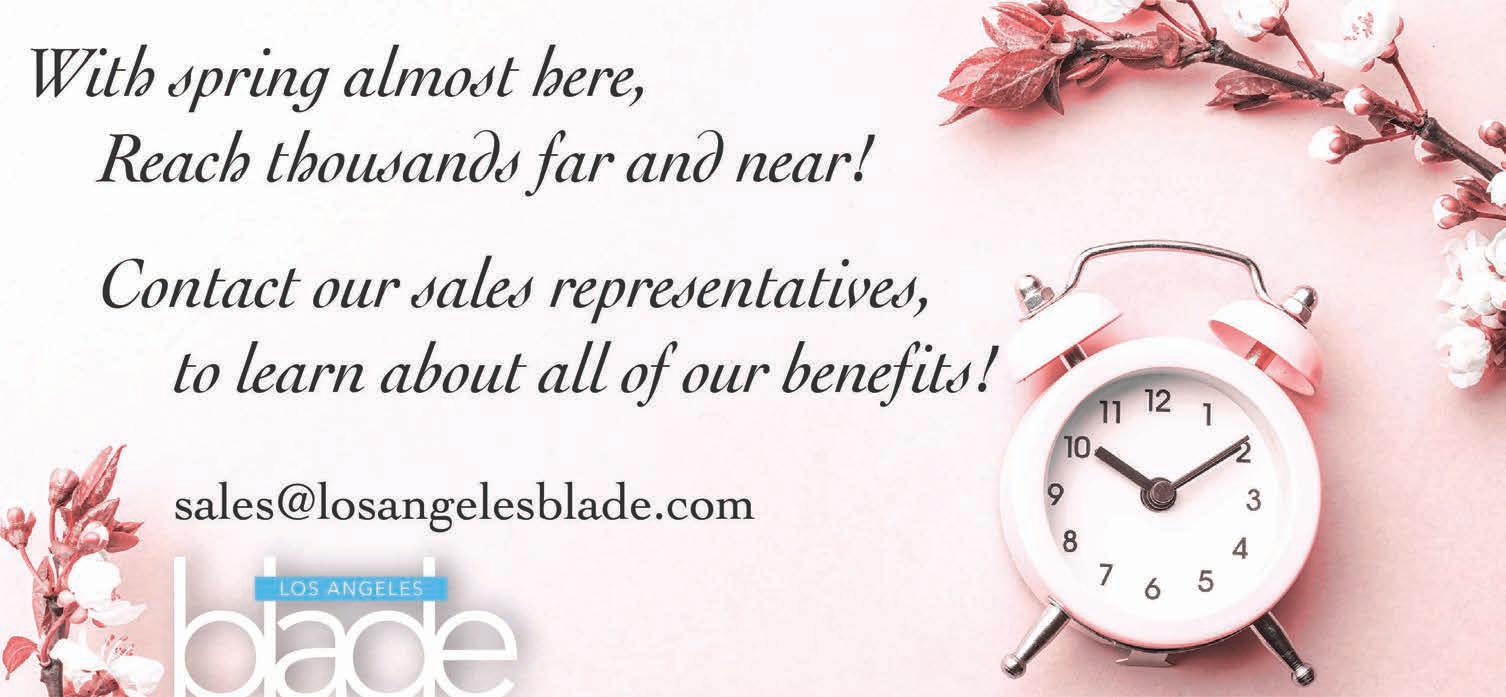
The UK import “Aftersun,” Charlotte Wells’ thoughtful father-daughter tearjerker starring Paul Mescal, which also is also nominated for Best Picture and Best Actor Oscars, was awarded the Dorian for Best “Unsung” Film.
“All the Beauty and the Bloodshed,” director Laura Poitras’ searing documentary about famed bisexual photographer Nan Goldin and her mission to shame the Sackler Big Pharma dynasty for profiteering on America’s opioid crisis, took both Best Documentary and Best LGBTQ Documentary; it’s also Oscar-nominated as Best Feature Documentary, the only queer-related doc to have made the cut there.
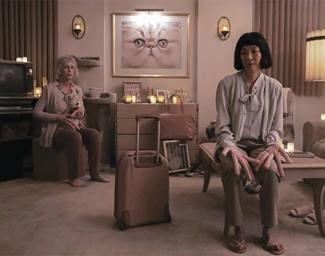


ENGLISH
BY Allan Baker
DIRECTED BY Michael Michetti



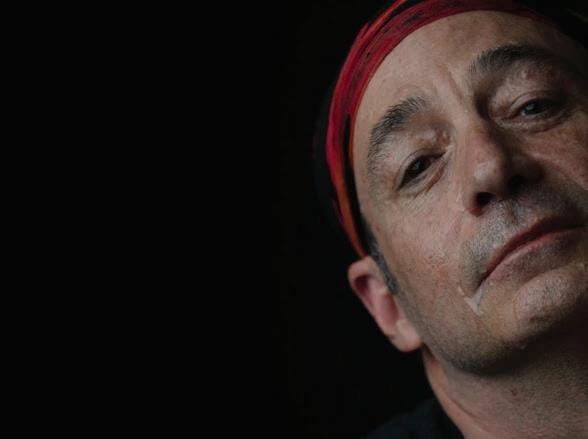 By TERRI SCHLICHENMEYER
By TERRI SCHLICHENMEYER
It’s OK. You’ll just make it up. Not the right toys when you were a kid? No problem, you had your imagination. No impressive friends to brag on? You can always pretend to know the rich, famous, or infamous. Boring job, cheap house, hoopty car? It’s fine, you can conjure whatever you want and who cares?
As in the new book, “The Girl I Am, Was, and Never Will Be” by Shannon Gibney, it’s all a fantasy anyhow. There are facts. Provable, honest facts.

Shannon Gibney was born Jan. 30, 1975, in Ann Arbor, Mich. So was rin Powers. Both were daughters of a Black petty criminal, and a white lesbian mother who struggled to give them up.
Another fact Shannon was rin, before she was adopted.
Shannon grew up in a middle-class white family with two brothers, a good education, toys, vacations, and stability. She had a “short relationship” with her birth father when she was an adult, and a longer (but shaky) one with her birth mother, which made her wonder what life might have been like, had she been raised as Erin.
When Erin was 19, she learned that her mother was dying of breast cancer, and wasting what life she had left. At 10, Erin had to learn to get along with her mother’s latest girlfriend; and she had to listen to racism from the white side of her family. Also at 10, she saw a spiraled portal and another girl who looked like her, but she didn’t entirely understand it.
c.2023, Dutton | $18.99 | 245 pages

Every year on her birthday, her mother mourned an adoption she never wanted to happen.
When Shannon was 10 years old, she was cruel to a boy who liked her, and she wasn’t sure why. When she was 19, her parents loaned her their car so she could visit her birth mother and her birth mother’s partner. And at 35, she was reminded of the legacy her mother left her, one she must be “diligent” about for the rest of her life.
A dozen pages or so into “The Girl I Am, Was, and Never Will Be,” author Shannon Gibney wrestles with the nature of lies, explaining that her book does, and does not, use “manufactured literary devices.” In other words, get ready for one really weird read.
And it remains as such, until you understand what’s going on the story here is fiction mixed with fact, an imaginary life framed by a real one. “ rin” is the fiction, as Gibney imagines her life as a series of struggles, personal and otherwise, living with her birth mother. “Shannon” is Gibney’s story of finding out who she is and where she came from. The tales merge and diverge, neither with a lot of sense until you’re well past the halfway mark of this book.
Can you stick with it that long? Readers ages 15 and up might at least try; you’ll lose a little time adjusting to “The Girl I Am, Was, and Never Will Be,” but don’t worry. You’ll make it up.
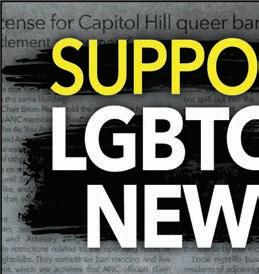
The diference in winning and losing market share is how businesses use their advertising dollars.
CNPA’s Advertising Services’ power to connect to nearly 13 million of the state’s readers who are an engaged audience, makes our services an indispensable marketing solution. For more info call Cecelia @ (916) 288-6011 or cecelia@ cnpa.com
Switch and save up to $250/year on your talk, text and data. No contract and no hidden fees. Unlimited talk and text with fexible data plans. Premium nationwide coverage. 100% U.S. based customer service. Limited time ofer get $50 of on any new account. Use code GIFT50. For more information, call 1-844908-0605
Become a Published Author. We want to Read Your Book! Dorrance Publishing-Trusted by Authors Since 1920. Book manuscript submissions currently being reviewed. Comprehensive Services: Consultation, Production, Promotion and Distribution. Call for Your Free Author`s Guide 1-877-538-9554 or visit http://dorranceinfo.com/ Cali

Publishing will help you self-publish your own book. FREE author submission kit! Limited ofer! Why wait? Call now: 1-855-667-0380
Prepare for power outages today with a GENERAC home standby generator.
$0 Money Down + Low Monthly Payment Options. Request a FREE Quote -Call now before the next power outage: 1-844-439-5645
Eliminate gutter cleaning forever! LeafFilter, the most advanced debris-blocking gutter protection. Schedule a FREE LeafFilter estimate today. 15% of Entire Purchase. 10% Senior & Military Discounts. Call 1-855424-7581
AUTOS WANTED
DONATE YOUR CAR TO KIDS Fast Free Pickup – Running or Not - 24 Hour ResponseMaximum Tax Donation – Help Find Missing Kids! Call 1-888-4911453.
DONATE YOUR CAR OR TRUCK TO HERITAGE FOR THE BLIND. Free 3 Day Vacation, Tax Deductible, Free Towing, All Paperwork Taken Care Of. CALL 1-844-491-2884
FREE high speed internet for those that qualify. Government program for recipients of select programs incl. Medicaid, SNAP, Housing Assistance, WIC, Veterans Pension, Survivor Benefts, Lifeline, Tribal. 15 GB internet service. Bonus ofer: Android tablet FREE with one-time $20 copay. Free shipping & handling. Call Maxsip Telecom today! 1-855480-0769
Get DIRECTV for $64.99/mo for 12 months with CHOICE Package. Save an additional $120 over 1st year. First 3 months of HBO Max, Cinemax, Showtime, Starz and Epix included! Directv is #1 in Customer Satisfaction (JD Power & Assoc.) Some restrictions apply. Call 1-888-641-5762
FINANCIAL SERVICES
Over $10K in Debt? Be debt free in 24 to 48 months. No upfront fees to enroll. A+ BBB rated. Call National Debt Relief 1-888-231-4274.
INSURANCE
SAVE BIG on HOME INSURANCE! Compare 20 A-rated insurances companies. Get a quote within minutes. Average savings of $444/year! Call 1-844-410-9609!
(M-F 8am-8pm Central)

REAL ESTATE/ LOANS
RETIRED COUPLE
$1 MIL for business purpose Real Estate loans. Credit unimportant. V.I.P. Trust Deed Company www.viploan.com Call 1-818-248-0000 Broker-principal DRE 01041073. No Consumer Loans.
WANTED TO BUY
TOP CA$H PAID FOR OLD GUITARS! 1920-1980 Gibson, Martin, Fender, Gretsch, Epiphone, Guild, Mosrite, Rickenbacker, Prairie State, D’Angelico, Stromberg. And Gibson Mandolins / Banjos. 1-844-9101960.
DID YOU KNOW
Newspaper-generated content is so valuable it’s taken and repeated, condensed, broadcast, tweeted, discussed, posted, copied, edited, and emailed countless times throughout the day by others? Discover the Power of Newspaper Advertising. For a free brochure call 916-288-6011 or email cecelia@cnpa.com

THIS SPACE CAN BE YOURS! CALL 1-916-288-6011 or email cecelia@ cnpa.com

